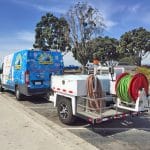For a business in San Diego, a sudden commercial plumbing catastrophe is more than just an inconvenience—it’s a direct threat to your revenue, reputation, and daily operations. A sewer backup can force you to close your doors, a failed water heater can shut down a restaurant kitchen, and a major leak can cause costly property damage. Unlike residential plumbing, commercial systems endure far greater demands and are subject to stringent health and safety regulations. This is why a reactive, “fix-it-when-it-breaks” approach is a dangerous gamble. A proactive, preventative plumbing maintenance plan is one of the most critical investments a business owner can make to ensure smooth operations and avoid expensive emergencies.
The Unique Demands of a Commercial System
The sheer volume of use is the primary difference in commercial plumbing. A toilet in a busy retail space gets hundreds of flushes in a day, compared to a dozen in a home. A restaurant’s kitchen drain handles gallons of fats, oils, and grease (FOG) every shift. This constant, heavy use puts immense strain on pipes, fixtures, and equipment, requiring more robust, commercial-grade hardware and, most importantly, regular professional oversight to prevent premature failure.
The Cornerstones of a Commercial Maintenance Plan
A professional preventative maintenance plan is tailored to the specific needs of your business but generally focuses on several key areas to prevent the most common and costly points of failure.
- Comprehensive Drain and Sewer Cleaning: For restaurants, regular hydro-jetting of kitchen lines is essential to clear the heavy FOG buildup that inevitably leads to backups and potential health code violations. For all businesses, annual cleaning of main sewer lines, restroom drains, and floor drains can prevent clogs that could otherwise shut down your facility.
- Grease Trap Pumping and Maintenance: Restaurants and food service businesses are legally required to have grease traps or larger grease interceptors. These devices prevent FOG from entering and damaging the municipal sewer system. Regular, professional pumping and cleaning of these traps is not only necessary for them to function correctly but is also mandated by local health and sanitation departments.
- Annual Backflow Prevention Testing: Commercial properties are required by law to have backflow prevention devices on their main water lines to protect the public water supply from contamination. As mandated by plumbing codes based on standards from organizations like the American Society of Sanitary Engineering (ASSE), these critical safety devices must be tested and certified annually by a licensed professional.
- Water Heater Inspection and Flushing: A commercial water heater is a mission-critical appliance. A maintenance plan includes checking for leaks, testing safety valves, and flushing sediment from the tank. This flushing process improves efficiency, extends the unit’s lifespan, and can prevent a premature and costly replacement.
- Fixture and Leak Checks: A technician will perform a full inspection of all toilets, faucets, urinals, and visible piping to identify small drips or leaks that waste water and often signal an impending fixture failure.
As the U.S. Small Business Administration (SBA) often advises, staying ahead of regulatory compliance is a key part of risk management. A plumbing maintenance plan helps ensure you are always up to code.
Your Partner for Commercial Plumbing in San Diego
Don’t let a preventable plumbing failure disrupt your business. A proactive maintenance plan is a smart investment that saves money, prevents downtime, and provides invaluable peace of mind. For business owners in San Diego, Blue Planet Plumbing offers customized plans and a full suite of commercial plumbing services. Contact us today to discuss a preventative plan for your property.








